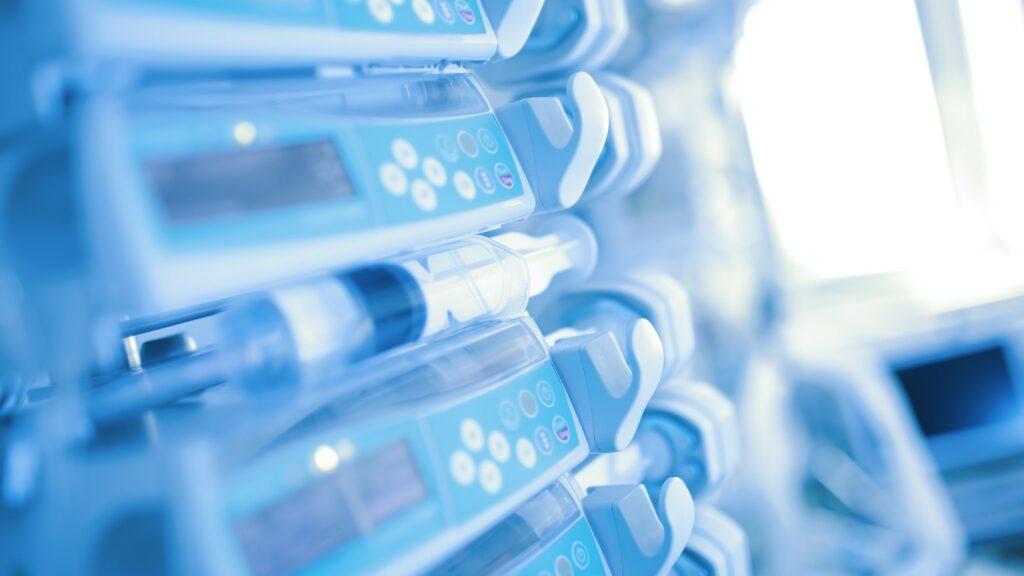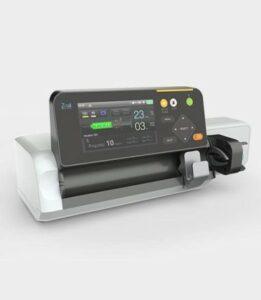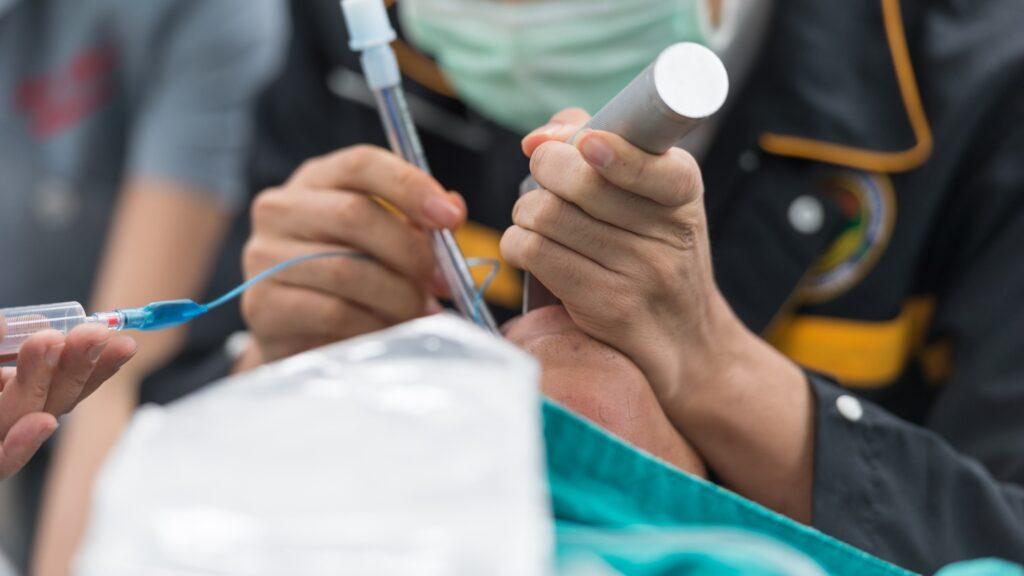The world of syringe pumps, where precision meets innovation in medication delivery. In the fast-paced realm of healthcare, the administration of medications requires utmost accuracy and control. Syringe pumps have emerged as indispensable tools that revolutionize the way medications are delivered in medical settings. From infusion syringe pumps to programmable wonders, we will delve into the inner workings of these devices, uncovering their mechanisms and uncovering the benefits they bring to patients and healthcare providers alike.
In this blog, we endeavor to present valuable perspectives and expert knowledge in order to provide you with a thorough comprehension of syringe pumps and their crucial significance within the medical field. So, join us on this exciting journey as we unlock the future of precise medication delivery with syringe pumps. Let’s dive in!
An Introduction to Infusion Syringe Pumps
These innovative devices provide precise control over the rate and dosage of medication delivery, ensuring accuracy and patient safety. By employing a syringe and motorized mechanism, infusion syringe pumps enable the controlled infusion of fluids or medications into the patient’s body.
With their ability to deliver medications at a constant rate or through programmed infusion profiles, these pumps offer healthcare providers the flexibility and precision necessary for various medical treatments. Whether it’s administering antibiotics, pain relievers, or chemotherapy drugs, infusion syringe pumps play a crucial role in delivering medications with accuracy, and minimizing the risk of errors.
Understanding Syringe Drivers: Precision in Medication Administration
Syringe drivers are specialized devices used in medical settings to ensure precise and controlled administration of medications. These compact and portable devices are designed to hold and drive syringes, facilitating the accurate delivery of medications over a specified period. Syringe drivers are particularly useful in situations where constant and continuous infusion is required, such as palliative care or long-term pain management.
Equipped with advanced features like adjustable flow rates and programmable infusion profiles, syringe drivers provide healthcare professionals with the means to customize medication administration based on individual patient needs. This level of precision allows for optimal pain management and therapeutic outcomes while maintaining patient comfort and safety.
The Basics of Syringe Infusion Pumps: Empowering Controlled Drug Delivery
Syringe infusion pumps play a vital role in empowering controlled drug delivery, ensuring precise administration of medications in medical settings. These devices are designed to accurately control the flow rate of medication by using a syringe as the drug reservoir. At the core of syringe infusion pumps is the syringe itself, which holds the medication to be delivered. The pump’s mechanism applies pressure to the syringe plunger, causing the medication to be dispensed at a controlled rate. This mechanism allows for precise control over the infusion process, enabling healthcare providers to administer medications with accuracy and consistency.
One of the primary benefits of syringe infusion pumps is their ability to deliver medications at a constant flow rate. This feature is particularly important when administering potent drugs or medications with narrow therapeutic windows, where even slight variations in the delivery rate can have significant effects on patient outcomes. By ensuring a consistent and controlled flow, syringe infusion pumps help minimize the risk of underdosing or overdosing, enhancing patient safety. Syringe infusion pumps find extensive application in various medical settings, including hospitals, clinics, and ambulatory care. They are commonly used for continuous infusions, such as pain management, chemotherapy, insulin administration, and critical care medications. By enabling controlled drug delivery, these pumps contribute to improved patient outcomes, reduced medication errors, and enhanced overall healthcare efficiency.
Exploring Programmable Syringe Pumps: Unleashing Advanced Medication Management
Programmable syringe pumps take medication administration to the next level by offering advanced features and capabilities. These pumps are equipped with programmable interfaces that allow healthcare providers to customize infusion parameters, including infusion rates, dosing intervals, and specific profiles. This programmability empowers healthcare professionals to optimize medication delivery based on individual patient needs and medical requirements.
The versatility of programmable syringe pumps extends beyond standard infusion protocols. These pumps often support complex medication regimens, such as those involving multiple medications or variable dosing schedules. By automating the administration process, programmable syringe pumps reduce the burden on healthcare providers and enhance patient safety by minimizing the risk of human error.
Demystifying the Functionality of Syringe Pumps: Mastering the Art of Precise Medication Delivery
Syringe pumps operate on the principle of controlled mechanical movement, ensuring accurate and consistent medication delivery. By precisely controlling the speed and force of the plunger movement, syringe pumps enable the delivery of medications at a controlled rate.
To ensure accuracy, syringe pumps are equipped with feedback mechanisms that monitor the actual flow of medication. These mechanisms can detect blockages, occlusions, or irregularities in the infusion line, triggering alarms or pausing the infusion to prevent potential complications. This closed-loop system enhances patient safety and allows healthcare providers to intervene promptly when necessary.
Unlocking the Benefits of Syringe Pumps: Revolutionising Healthcare
There are numerous benefits to patients and healthcare providers from the introduction of syringe pumps to the healthcare industry. These benefits include:
- Precise Medication Delivery: Syringe pumps allow for accurate and controlled medication administration, reducing the risk of under or overdosing.
- Enhanced Patient Safety: The closed-loop systems and advanced safety features of syringe pumps minimize the potential for errors and adverse events, ensuring patient safety.
- Optimal Therapeutic Outcomes: By delivering medications with precision, syringe pumps optimize the therapeutic effects of drugs, leading to improved patient outcomes.
- Flexibility and Customization: Syringe pumps offer adjustable infusion rates and programmable profiles, enabling healthcare providers to tailor medication delivery to individual patient needs.
- Increased Efficiency: Automated medication administration with syringe pumps saves time for healthcare providers, allowing them to focus on other critical aspects of patient care.
- Reduced Workload: Syringe pumps alleviate the manual labor involved in medication administration, reducing the strain on healthcare professionals and improving workflow efficiency.
- Improved Patient Experience: The controlled and steady delivery of medications through syringe pumps enhances patient comfort and reduces pain associated with abrupt administration.
As syringe pumps continue to evolve and incorporate advanced technologies, the benefits they bring to healthcare are poised to grow even further, shaping the future of medication delivery.
Exploring the Applications of Syringe Pumps: A Diverse Range of Medical Scenarios
Syringe pumps find applications in a wide range of medical scenarios, where precise medication delivery is essential. Some notable applications include:
- Critical Care: Syringe pumps play a vital role in intensive care units (ICUs) and emergency departments, where continuous and accurate drug infusion is crucial for stabilizing patients and managing critical conditions.
- Pain Management: Syringe pumps are employed in pain management settings to administer analgesics or opioids at controlled rates, ensuring optimal pain relief while minimizing side effects.
- Chemotherapy: Syringe pumps are utilized in oncology settings to deliver chemotherapy drugs with precision, allowing for effective cancer treatment while reducing the risk of systemic toxicity.
- Neonatal and Pediatric Care: Syringe pumps are extensively used in neonatal and pediatric units, where accurate medication delivery in small volumes is critical for the well-being of fragile patients.
- Palliative Care: By delivering medications in a continuous and controlled manner, these pumps help manage symptoms and enhance the overall quality of life for those in need, providing compassionate care during challenging times.
- Research and Clinical Trials: Syringe pumps play a significant role in research studies and clinical trials that require precise administration of investigational drugs or experimental therapies.
These applications highlight the versatility and importance of syringe pumps in diverse medical settings, where they contribute to improved patient care and outcomes.
The Importance of Syringe Pump Calibration: Safeguarding Accuracy and Patient Safety
Syringe pump calibration is a critical process that ensures the accuracy and reliability of medication delivery. Calibration involves verifying and adjusting the pump’s settings to align with the desired infusion parameters. By calibrating syringe pumps regularly, healthcare providers can minimize the risk of dosage errors and maintain patient safety.
During the calibration process, healthcare professionals verify the accuracy of the pump’s flow rates and volume measurements by comparing them to a calibrated reference standard. If any discrepancies are detected, adjustments are made to align the pump’s performance with the desired standards. This calibration procedure helps prevent under-infusion or over-infusion of medications, promoting accurate dosage administration and minimizing potential adverse effects.
Regular calibration also ensures compliance with regulatory requirements and industry standards, contributing to the overall quality assurance of healthcare facilities. It is essential to follow the manufacturer’s guidelines and recommended calibration intervals to maintain the accuracy and reliability
Ensuring Optimal Performance: Syringe Pump Maintenance for Longevity and Reliability
Syringe pumps are no exception. These sophisticated devices require regular maintenance to guarantee longevity and reliability, ultimately contributing to patient safety and efficient healthcare delivery.
To maintain the optimal performance of syringe pumps, several essential practices should be followed. It is crucial to keep the pump clean and free from contaminants. Regularly wiping down the exterior surfaces and disinfecting them according to the manufacturer’s instructions is vital to prevent the buildup of harmful bacteria or viruses. Check the power cords, cables, and connectors for any fraying or damage, and replace them if necessary. Regularly inspect the syringe drive mechanism, ensuring it moves smoothly and without any unusual noise or resistance.
Calibration is another critical aspect of syringe pump maintenance. Regular calibration ensures accurate medication delivery and patient safety. Follow the manufacturer’s guidelines for calibration procedures, which may involve using a calibration kit or working with a qualified technician.
Lastly, staying up to date with software updates and firmware upgrades is crucial. Manufacturers often release updates to address any known issues, enhance functionality, and improve overall performance. Keeping the syringe pump’s software current ensures optimal operation and compatibility with other devices and systems.
By following these maintenance practices diligently, healthcare providers can ensure that syringe pumps perform optimally, providing reliable and accurate medication delivery to patients.
Troubleshooting Common Syringe Pump Issues: Overcoming Challenges for Uninterrupted Care
While syringe pumps are highly sophisticated devices, they can encounter occasional issues that require troubleshooting. Being familiar with common problems and their solutions can help healthcare providers overcome challenges and ensure uninterrupted care for patients.
One common issue is occlusion detection, where the syringe pump detects an obstruction in the infusion line. This can be caused by kinked tubing, blocked filters, or improperly loaded syringes. To troubleshoot this issue, carefully inspect the infusion line, ensuring it is free from any obstructions. Straighten any kinks in the tubing, replace blocked filters, and verify that the syringe is properly loaded and aligned.
Another issue that may arise is an inaccurate flow rate. This can occur due to factors such as a worn-out syringe plunger, incorrect syringe size selection, or incorrect pump settings. To address this problem, check the syringe plunger for signs of wear and replace it if necessary. Double-check the syringe size selection and ensure that the pump settings accurately reflect the desired flow rate.
Power-related issues can also impact syringe pump performance. If the pump fails to power on or experiences intermittent power loss, check the power cord and connections for any loose or damaged components. Ensure the power source is stable and functioning correctly.
Additionally, syringe pump alarms and error codes can provide valuable information for troubleshooting. Refer to the user manual or consult the manufacturer’s support resources to interpret the specific codes and take appropriate action. By being proactive and knowledgeable in troubleshooting common syringe pump issues, healthcare providers can swiftly resolve problems, ensuring uninterrupted care and patient safety in medical settings.
Syringe pumps From Leading Indian Manufacturers
BM-51
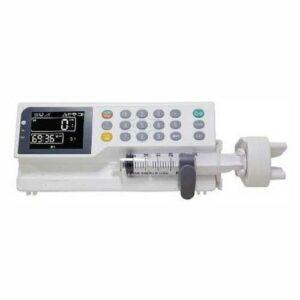 BM-51 is a syringe pump manufactured and globally supplied by Bird Meditech, a renowned medical device manufacturer from India. This compact and lightweight syringe pump offers accurate delivery of medications through a single-channel disposable syringe. With its versatile design, the BM-51 is capable of supporting syringes of various sizes, ranging from 2ml to 60ml. The device is equipped with easy configure and use keys, making it user-friendly for healthcare professionals. Additionally, the BM-51 comes with a power adapter for convenient operation and can transfer therapy data via Wifi. It also features multiple alarms, including a battery exhaustion alarm, a low battery alarm, a never-end alarm, an incorrect syringe handle installation alarm, and a pause overtime alarm, ensuring patient safety and efficient medication administration.
BM-51 is a syringe pump manufactured and globally supplied by Bird Meditech, a renowned medical device manufacturer from India. This compact and lightweight syringe pump offers accurate delivery of medications through a single-channel disposable syringe. With its versatile design, the BM-51 is capable of supporting syringes of various sizes, ranging from 2ml to 60ml. The device is equipped with easy configure and use keys, making it user-friendly for healthcare professionals. Additionally, the BM-51 comes with a power adapter for convenient operation and can transfer therapy data via Wifi. It also features multiple alarms, including a battery exhaustion alarm, a low battery alarm, a never-end alarm, an incorrect syringe handle installation alarm, and a pause overtime alarm, ensuring patient safety and efficient medication administration.
Syringe Pump
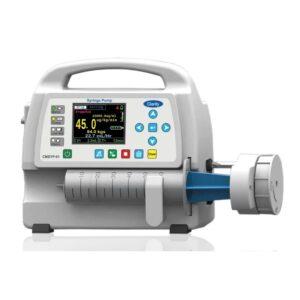 The Syringe Pump manufactured by Clarity Medical Pvt. Ltd. is a cutting-edge fluid delivery device that offers precise control over the rate of fluid infusion. As a leading manufacturer and global supplier of syringe pumps in India, Clarity Medical is dedicated to delivering high-quality medical equipment. The Syringe Pump features a color TFT display with adjustable brightness, providing clear and easy-to-read information. It is equipped with unique audio and visual alarms, allowing healthcare providers to set variable alarm pauses and time settings. The pump also includes a battery level indicator for added convenience. With a real-time clock and drugs library available, the syringe pump enables automatic syringe size detection and the restoration of the last set with additional volume. It incorporates a pressure release mechanism for occlusion detection and offers an RS-232 serial link for data communication. The Syringe Pump offers four distinct bolus modes, along with the KVO (keep vein open) feature, ensuring precise medication delivery and patient safety.
The Syringe Pump manufactured by Clarity Medical Pvt. Ltd. is a cutting-edge fluid delivery device that offers precise control over the rate of fluid infusion. As a leading manufacturer and global supplier of syringe pumps in India, Clarity Medical is dedicated to delivering high-quality medical equipment. The Syringe Pump features a color TFT display with adjustable brightness, providing clear and easy-to-read information. It is equipped with unique audio and visual alarms, allowing healthcare providers to set variable alarm pauses and time settings. The pump also includes a battery level indicator for added convenience. With a real-time clock and drugs library available, the syringe pump enables automatic syringe size detection and the restoration of the last set with additional volume. It incorporates a pressure release mechanism for occlusion detection and offers an RS-232 serial link for data communication. The Syringe Pump offers four distinct bolus modes, along with the KVO (keep vein open) feature, ensuring precise medication delivery and patient safety.
Z-Infuse
Designed by Zeal Medical Pvt. Ltd., Z-Infuse is a highly reliable infusion pump that delivers small amounts of the medication gradually and in a controlled manner. With its robust design, Z-Infuse is suitable for use in hospitals where maintaining a contamination-free environment is crucial. The device is equipped with an appealing LCD TFT display, providing clear visibility of the infusion parameters. It incorporates automatic syringe detection technology, ensuring accurate medication administration. Z-Infuse offers three distinct modes, allowing healthcare providers to choose the most appropriate setting for their patients’ needs. This feature enhances patient safety and streamlines workflow in medical settings. With its reliable performance and advanced features, Z-Infuse is a trusted choice for controlled medication delivery.
AKAS SYRU 4004
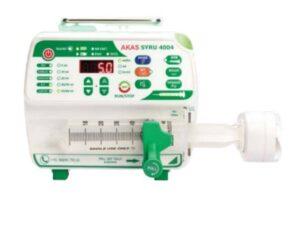 Manufactured by AKAS Medical Equipment [AKAS Infusions], AKAS SYRU 4004 is a highly reliable and efficient syringe pump. This lightweight device is designed for ease of transport, making it suitable for emergency applications. It offers a long power backup, ensuring uninterrupted operation during critical situations. The compact and environmentally friendly design of AKAS SYRU 4004 includes IP protection, safeguarding the pump from moisture and dust. The pump features five modes of operation, providing flexibility for different medication administration requirements. It is equipped with an anti-bolus function to prevent unintended bolus delivery, ensuring patient safety. The device includes a uni power socket for a convenient power supply and is equipped with a safety alarm system for prompt alerts. AKAS SYRU 4004 offers healthcare professionals a reliable solution for accurate medication delivery in various clinical settings.
Manufactured by AKAS Medical Equipment [AKAS Infusions], AKAS SYRU 4004 is a highly reliable and efficient syringe pump. This lightweight device is designed for ease of transport, making it suitable for emergency applications. It offers a long power backup, ensuring uninterrupted operation during critical situations. The compact and environmentally friendly design of AKAS SYRU 4004 includes IP protection, safeguarding the pump from moisture and dust. The pump features five modes of operation, providing flexibility for different medication administration requirements. It is equipped with an anti-bolus function to prevent unintended bolus delivery, ensuring patient safety. The device includes a uni power socket for a convenient power supply and is equipped with a safety alarm system for prompt alerts. AKAS SYRU 4004 offers healthcare professionals a reliable solution for accurate medication delivery in various clinical settings.
SP 101
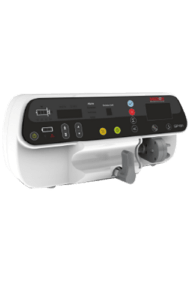 SP 101 is an innovative syringe pump manufactured by Medion Healthcare Pvt. Ltd. This feature-rich pump is designed with convenience and efficiency in mind. Its front-loading system allows for easy access to the clamp and syringe plunger, making it convenient for both patients and nurses. The pump’s compact, rugged, and sturdy design ensures durability and reliable performance. With its digital display and aesthetically enhanced appearance, the SP 101 offers a user-friendly interface. It features an automatic detection mechanism that identifies the loaded syringe size, eliminating the need for manual adjustments. The built-in KVO (keep vein open) feature ensures a continuous low infusion rate to prevent vein blockage. The SP 101 incorporates a host of alarms and safety features, including adjustable occlusion pressure levels and an inbuilt battery backup of up to 6 hours. With its calibration compatibility with any brand of syringe and flow rates ranging from 0.1 ml/hr to 1500 ml/hr, the SP 101 offers precise medication delivery and enhances patient care.
SP 101 is an innovative syringe pump manufactured by Medion Healthcare Pvt. Ltd. This feature-rich pump is designed with convenience and efficiency in mind. Its front-loading system allows for easy access to the clamp and syringe plunger, making it convenient for both patients and nurses. The pump’s compact, rugged, and sturdy design ensures durability and reliable performance. With its digital display and aesthetically enhanced appearance, the SP 101 offers a user-friendly interface. It features an automatic detection mechanism that identifies the loaded syringe size, eliminating the need for manual adjustments. The built-in KVO (keep vein open) feature ensures a continuous low infusion rate to prevent vein blockage. The SP 101 incorporates a host of alarms and safety features, including adjustable occlusion pressure levels and an inbuilt battery backup of up to 6 hours. With its calibration compatibility with any brand of syringe and flow rates ranging from 0.1 ml/hr to 1500 ml/hr, the SP 101 offers precise medication delivery and enhances patient care.
Conclusion
Syringe pumps have revolutionized medication delivery in the medical industry, offering precise and controlled administration of drugs. From infusion syringe pumps to programmable wonders, these devices have proven to be invaluable tools in healthcare settings. To ensure optimal performance, regular maintenance and calibration of syringe pumps are essential. By adhering to recommended maintenance practices and troubleshooting common issues, healthcare providers can guarantee uninterrupted care and maximize the longevity of these devices.
In conclusion, syringe pumps have emerged as indispensable tools in modern medicine, facilitating accurate and controlled drug delivery. As technology continues to advance and platforms like Medzell connect the medical industry, the future of syringe pumps looks promising, ensuring safer and more effective treatment for patients around the world.
